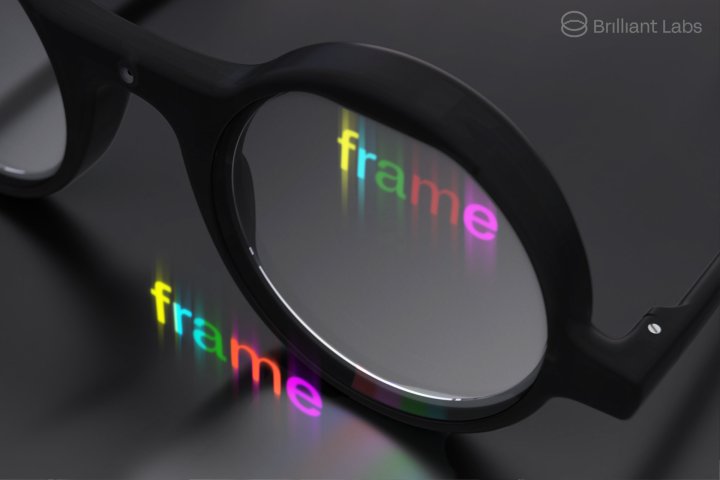
Smart glasses keep getting better and adding more features. The latest from Brilliant Labs is called Frame, a pair of smart glasses with two primary points of interest: an astounding weight of just 39 grams and some nifty AI features.
According to the online retailer Glasses.com, “the majority of eyeglasses weight 25 to 50 grams.” The fact that Frame sits right in the middle of this range is seriously impressive, especially since the glasses have a built-in camera and display. It’s even more impressive when you consider the price of $349. For reference, the Ray-Ban Meta Smart Glasses are only $50 cheaper despite weighing 49 grams and not including a display.
The display on Frame is monocular, meaning the text and graphics are displayed over the right eye only. It’s fairly bright (3,000 nits), though, so readability should be good even outdoors in sunlit areas.

The optics consist of a small prism occupying 20 degrees within your field of view. Brilliant Labs says this 640-by-400-pixel color display is roughly equivalent in size to an iPad held at arm’s length. The lenses are thick compared to sunglasses, but a quarter of an inch (6mm) is slim compared to popular smart glasses that feature 1080p displays.
Frame isn’t competing with Xreal’s Air 2 or any of the latest display smart glasses, which can serve as portable TVs or connect to your Steam Deck for gaming. Instead, it’s meant to be an AI assistant that helps you get through your day, along with taking photos, which can be done with the camera located in the bridge of the glasses. Brilliant Labs claims that the all-day battery life is based on using Frame 10 to 20 minutes each hour.
Naturally, many questions follow that intriguing introduction: What is Brilliant Labs? What can you do with Frame? How can the price be so low?
Brilliant Labs is an augmented reality startup founded in 2019. The company got some viral buzz last year with its first product Monocle, an open-source, clip-on lens that adds AI capabilities and a screen to regular glasses. AI researcher Bryan Chiang tweeted a video showing Monocle helping answer questions during a staged job interview.
say goodbye to awkward dates and job interviews ☹️
we made rizzGPT — real-time Charisma as a Service (CaaS)
it listens to your conversation and tells you exactly what to say next 😱
built using GPT-4, Whisper and the Monocle AR glasses
with @C51Alix @varunshenoy_ pic.twitter.com/HycQGGXT6N
— bryan chiang (@bryanhpchiang) March 26, 2023
Frame is the next product from Brilliant Labs, and from the looks of it, is a more attractive and compelling product. Frame AI glasses use Perplexity AI for fast response time and recent web information. Frame can also accept multimodal input, responding to your voice and what it can see in your environment.
According to Brilliant Labs, Frame can answer questions related to what you’re looking at. You can ask Frame to price-check products in a retail clothing store, and it will check Amazon and show you the results while your phone remains in your pocket or bag. Look at a home to search for its listing on Redfin or Zillow.
Beyond shopping, Frame can assist with DIY home repairs, provide directions, count steps, show restaurant reviews, and more. With real-time information accessed by the AI, the glasses become a universal assistant for nearly any task.
Frame might require a subscription to use some AI features, and prices haven’t been determined yet. Since Frame uses Perplexity AI, that could help give you an idea of the cost. Perplexity AI’s website has a free tier, but for more daily queries and multimodal use, you need a subscription that’s $20 per month or $200 per year.
Frame is now available for preorder via the Brilliant Labs website. Prescription lenses are bonded to Frame, so make sure to find that option before ordering. Brilliant Labs says Frame will begin shipping in April.
Editors' Recommendations
- This airline is first to offer in-flight AR glasses
- Xreal brings spatial computing to a pair of AR glasses
- These new smart glasses put a 500-nit, 330-inch screen on your eyes
- Are AR glasses still a pipe dream? I tested 3 of the newest to find out
- These AR glasses showed me the future of spatial computing — and I’m excited




